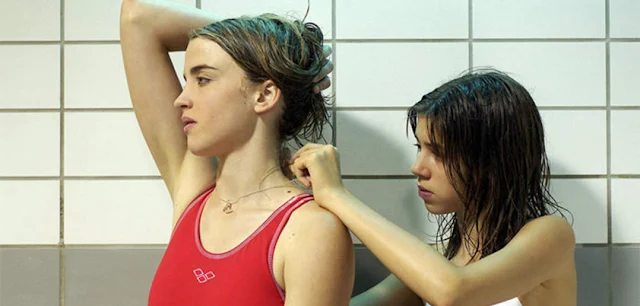 |
| Adèle Haenel and Pauline Acquart in Water Lilies |
I admit to a certain queasiness about watching Water Lilies, with its almost too intimate exploration of the lives of teenage girls, including some nudity. Céline Sciamma of course wants us to feel that way, to make us aware of these adolescent bodies as well as the souls that inhabit them. One girl, Marie (Pauline Acquart), is skinny and awkward; another, Anne (Louise Blachère), is on the verge of being overweight; and the third, Florine (Adèle Haenel), is flat-out beautiful. All of them spend much of their time at the swimming pool, where Florine is the star of a group of synchronized swimmers, and Anne coaches a group of beginners. Marie is the hanger-on who watches the other girls with a too-eager eye. At the film's start, she and Anne are close, but as Marie becomes involved with Florine, the two drift apart. There is a pivotal boy in the ensemble, the handsome François (Warren Jacquin), whom Anne desires -- at one point she she sees him looking at her naked in the locker room; she doesn't cover up in embarrassment but is rather pleased, and begins to try to win him. But François is after Florine, who strikes a deal with Marie: She'll let Marie watch the group practicing if she'll help her sneak out of the house at night to meet with François. Eventually, a different relationship develops between Marie and Florine. Sciamma choreographs this pas de quatre well, but there's something a little too formulaic and voyeuristic about the film, which doesn't resolve itself into significance. Still, its portrait of the sexual confusion of adolescence is often achingly real.
